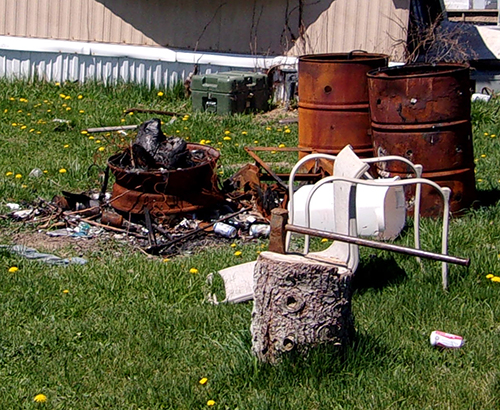 Spring is in the air across the Commonwealth. Along with the aromas of flowers, fresh-cut grass, and mouth-watering barbecues, do you detect a burning problem in your neighborhood?
Spring is in the air across the Commonwealth. Along with the aromas of flowers, fresh-cut grass, and mouth-watering barbecues, do you detect a burning problem in your neighborhood?
Burning household trash may seem like a cheap and easy way to eliminate waste, but it contributes to air pollution and threatens human health. A few dozen households burning their trash daily in barrels can produce levels of toxic emissions comparable to a well-controlled, 200-ton per day municipal incinerator. Burn barrels can release acid vapors, dioxins, heavy metals, carbon monoxide, fine particulate matter, and more pollutants that you and your family, pets, and neighbors don't want to breathe.
How can burning simple household trash be so harmful? To start, today's typical trash bag contents are dramatically different from your grandparents' refuse. The use of plastic packaging and components has increased exponentially: Even most "paper" drink cups now contain plastics. Household trash can also contain hundreds of different chemicals used in product coatings, plus a cornucopia of synthetic fabrics, metals, vinyl, rubber, painted or treated wood, and other sundry materials that should never be burned.
Health impacts from breathing the smoke from household trash can be short- and long-term, including lung and eye irritation, child developmental delays, emphysema, immune suppression, and cancer. The closer a person is to waste that is burning, the higher the risk of inhaling dangerous pollutants, some of which are invisible. But even at a distance, air quality impacts can have real-life health consequences.
The ashes left behind from household burning pose another hazard. These ashes often contain high levels of metals and other toxins. Discarding ashes on the surface of the ground or burying them can impact soil, surface water, and groundwater, including private water wells.
Perhaps most obviously, open burning creates a fire risk. No one wants to be liable for starting a fire that damages property, burns down a forest, or puts lives at stake.
What are the rules about open household burning in Pennsylvania? Many local municipalities have enacted total bans on open burning, including virtually all densely populated areas of the Commonwealth. Other local ordinances place restrictions on the time, place and manner of open burning. State law narrowly allows burning of "domestic refuse" where it is not locally prohibited. Some of the many restrictions under the state regulations make burning the following illegal: waste generated by a business; construction/demolition waste; furniture; automobiles and parts, including tires; batteries; waste oil and petroleum products; appliances and electronics; and more.
Looking for a better way to handle waste? Consider ways to:
- Reduce the waste you generate by being a careful consumer.
- Reuse, donate and recycle everything you can.
- Compost organic materials like grass clippings, yard waste, and food scraps.
- Dispose what you must in regulated landfills.
- If you don't currently have residential waste hauling, talk to your neighbors and local haulers to see if you can team up to get curbside service at an affordable rate.
- Buy products that are made from recycled materials to help boost recycling markets and reduce waste.
To find a model municipal ordinance on open burning, more information on proper disposal of household waste, and other information, please visit
DEP's Open Burning Information web page.